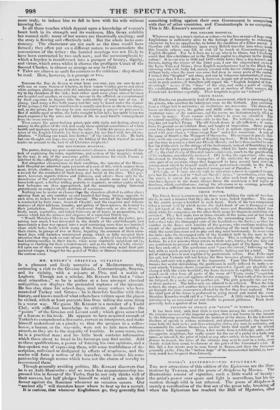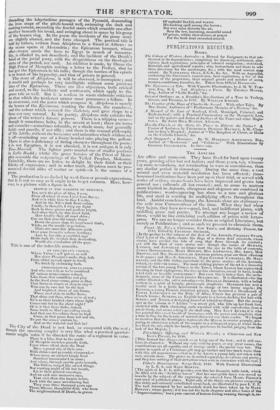MOOR E'S A LCI emit o N—T IIE it AN.
THE new attractions of this edition of the :Epicurean are the illus- trations by TURN ER, and the poem of Alciphron by Mown:. The illustrations consist of vignettes, each a little world of' beauty the artist's power over space and light is marvellous, but his In- vention though wild is not ethereal. The poem of Ala phron IS merely a versification of the first act of the prose tale, breaking off when the Epicurean has reached the Hall of Mysteries, after
threading the labyrinthine passages of the Pyramid, descending the iron steps of the pitch-bound well, swimming the dark and rushing torrent, ascending the fearful stairs which crumble one after another beneath his tread, and swinging about in space by his grasp of the brazen ring. In the poem the incidents of the prose story are slightly altered, anti the form changed. The poetical tale is told by letters, written from Alciphron to a friend at Athens : so the scene opens at Alexandria ; the Epicurean banquet, whose after-dream sends the hero to Egypt in search of immorta- ay, is alluded to, not described; and the incident of the Death's head at the jovial party, with the disquisitions on the theological state of the period, are sunk. An addition is made, by Orcus the nigh Priest of Memphis writing a letter to the Prefect, that he has got the Epicurean in his toils ; though the burden of his epistle is to boast of his hypocrisy, and that of priests in general.
The story of Akiphron, it will be observed, is incomplete ; and it would not perhaps be very intelligible without some previous idea of the Epicurean. There are also objections, both critical and moral, to the incidents mid sentiments, which apply to the prose tale as well. But iL is useless to waste elaborate criticism on that which the tenderest censor must pronounce a failure. In its structure, and the parts which compose it, AlciAron is merely the bones of the Epicurean, wanting the fulness, the roundness, and the colour which covered the skeleton, and gave shape to a form not very natnral. In its poetry, Ateiphron only exhibits the ghost of the writer's former powers. There is a tripping verse— though it sometimes halts, in the accent at least ; there are turns and conceits—sometimes tolerable, or a shade more, but generally feeble and puerile, if not silly ; and there is the sensual philosophy of Mr. Little, without the buoyancy and animation which whilom set it off—reminding one of a hoary-headed rake playing the gallant. There is also a deficiency of fitting character throughout the poem : it is not Egyptian, it is not classical, it is not antique, it is only Tssi-Hoorish. The lighter parts remind one of similar portions in Lulk Rookh ; whilst the grave heroics of the Priest of Mem-
phis resemble the outpourings of' the Veiled Prophet, Mokanna. Unluckily, there arc no lyrics, to delight by their finish or their
felicity of expression : and in sober truth, Akiphron must be pro- nounced devoid alike of matter or spirit—it is the manes of a poem.
The production is Si) dashed by weak lines or prosaic expressions, that it is not so easy as it ought to be to get extracts. Here, how- ever, is a picture with a figure in it.
SKETCH IN THE GARDENS OF EPICURUS.
Yes, such the pleec of bliss, I own,
From nil whose elsunts I just have flown ; And eV.11 while this to thee I write, And by the Nile's dark flood recline,
Fondly, in thoueht, I wing my tlight Back to those groves and grnlens bright, Anil often think, by this seeet How lovelily they all must shine ;
Can see that graceful temple throw
Down the green slope its lengthened shade, While, on the marble steps below, There sits some fair Athenian maid, Over some fscourite volume bending ; And, by her side, a youthful sage Holds back the rin;dets that, descending, Would else o'crshadow all the page.
This is one of the tolerable conceits.
AN EPICUREAN'S CHOICE.
Where Virtue's self put on so well Tier sister Pleasure's smile, that, loth From either nymph apart to dwell, We finish by embracing both.
PHILOSOPHICAL SPECULATION. And who can tell, as we're combined Of various atoms—sonic refined, Like those ilea scintillate and play. In the fixed stars—some, gross as they That frown in clouds or sleep in clay— Who Cain be sure but 'tis the best
Alai brightest atoms of our frame, Those Most akin to stellar flame, That shine out thus, when we're at rest ; Ev'tt as their kindred stars, whose light Comes out but in the silent night ? Or is it that there lurks, indeed, Some truth in Man's prevailing creed, And that our Giterdians from on high Come, in that pause from toil and sin, To put the senses' curtain by, And on the wakeful soul look in?
The City of the Dead is not bad, as compared with the rest ; though the opening couplet is very like what a poetical quarter- master might write if he directed the route of a regiment in verse.
There is a lake, that to the mirth Of Memphis stretches grandly forth, Upon whose silent shore the [lead Have a proud city of their own. With shrines and pyramids ti'erspread,— Where many an alnico kingly bead Slumbers inntiortaliz'd in stone; And where, through marble ''rote beneath, The lifeless, ranged like sacred. things, Nor wanting aught of litb but breath, Lie in their painted coverings, And on each new successive mee, That visit their dim haunts below, Look with the same unwithering face
They wore three thousand years ago. There, Silence, thoughtful God, who loves The neighbourhood of Death, in groves Of asphodel lies hid, and weaves His hushing spell among the leaves ; Nor ever noise disturbs the air,
Save the low. humming, mournful sound Of priests, within theirshrines at prayer For the fresh dead entombed around.



























 Previous page
Previous page